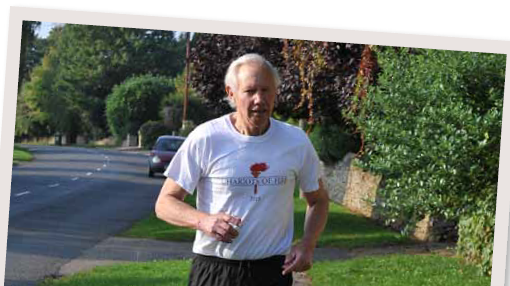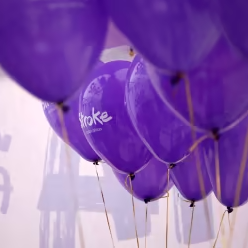
Press release -
Peterborough stroke survivor finds his voice
Wansford resident Leonard du Pisanie, 72, is on the road to recovery after a stroke left him unable to talk in 2013.
Leonard, a former Educational Psychologist, was at home watching TV when his wife noticed that Leonard had a crooked smile. When she tried to talk to him she realised that Leonard couldn’t speak, and quickly dialled 999.
Leonard was left with right side paralysis and severe communication difficulties following his stroke.
Despite his stroke, Leonard has been determined to find ways to communicate again. Leonard has joined a local choir, meets with the local Stroke Association communication coordinator each week and has regular sessions with a speech therapist.
Leonard said: “Life is completely different since my stroke, but I’m not going to let it beat me. I’m taking my recovery one day at a time, and I’m so grateful to the Stroke Association for their support.”
Leonard is one of more than 350,000 people in the UK with aphasia, a communication disability which can affect people’s ability to speak, read, write, use numbers and understand but not their intelligence. Aphasia is caused by stroke, head injury or other neurological conditions.
One of the biggest challenges for Leonard is that many people do not know enough about aphasia or how they can help people with the communication disability.
Leonard added: “Aphasia affects a wide area of activities involving communication, such as phoning, texting, emailing, shopping and of course most importantly socialising. Even making and attending appointments with medical people or others, collecting medicines from the pharmacy can be difficult. There are many other areas as well. It is turning out to be a lot more complicated than I felt at the beginning.
“Aphasia does not affect some activities I love to do, for example, going to the gym, cycling, running, hiking, gardening and choir singing, but it has affected my ability to read as I now read far more slowly.”
“I feel it’s important that more people understand the substantial difficulties in communicating for those with aphasia after a stroke. And the advice I would give when talking to someone with aphasia is: give that person the full time they need to tell you what they want to say.”
Hannah Longlands, Communication Support Coordinator at the Stroke Association, said: “Leonard has shown incredible determination in his recovery. When I first met Leonard he had lost some confidence and he found conversations difficult and frustrating. Three years on, and those difficulties have not gone away, but Leonard’s confidence has grown and he doesn’t let aphasia get in the way of trying new things.
“Having aphasia can be so frustrating because many stroke survivors know what to say, but are unable to make themselves understood. Seemingly ordinary tasks like buying a pint of milk or using money can feel very stressful, and it is easy to lose confidence. Many people with aphasia can feel very isolated as a result.
“If people working in shops, cafes, banks and a huge variety of other customer service roles know about the disability and follow a few of our simple tips, the barriers to communication can start to be broken down.”
The Stroke Association is raising awareness of aphasia and how people in the community can help support stroke survivors affected by the condition. To support this campaign, you can go to stroke.org.uk/aphasia or search for #aphasia on social media.
You can also find out more about our Communication and Long Term Support Service by phoning Hannah Longlands on 01572 757087 or emailing Hannah.Longlands@stroke.org.uk
Topics
A stroke is a brain attack which happens when the blood supply to the brain is cut off, caused by a clot or bleeding in the brain. There are around 152,000 strokes in the UK every year and it is one of the largest causes of disability. There are over 1.2 million people in the UK living with the effects of stroke.
Stroke Association is a charity. We believe in life after stroke and together we can conquer stroke. We work directly with stroke survivors and their families and carers, with health and social care professionals and with scientists and researchers. We campaign to improve stroke care and support people to make the best recovery they can. We fund research to develop new treatments and ways of preventing stroke. The Stroke Helpline (0303 303 3100) provides information and support on stroke. More information can be found at www.stroke.org.uk











